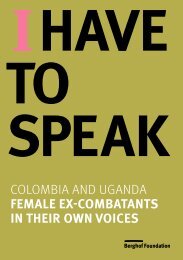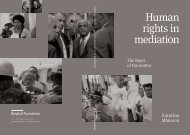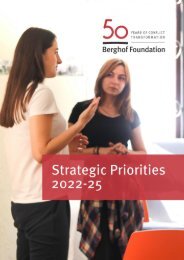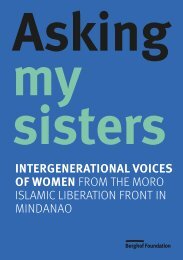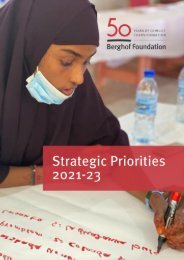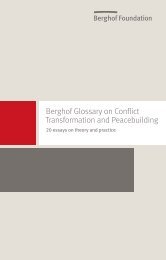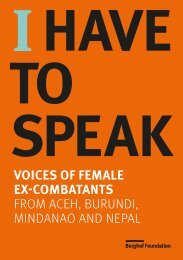Berghof Foundation: 50 years of conflict transformation
This book provides an overview of the Berghof Foundation’s work and impact over the past 50 years and sheds light on the challenges ahead of peacebuilding.
This book provides an overview of the Berghof Foundation’s work and impact over the past 50 years and sheds light on the challenges ahead of peacebuilding.
Create successful ePaper yourself
Turn your PDF publications into a flip-book with our unique Google optimized e-Paper software.
Providing space<br />
for innovation<br />
The <strong>Bergh<strong>of</strong></strong><br />
<strong>Foundation</strong><br />
as grant-maker<br />
1981–2015<br />
To complement its own operational activities and<br />
to explore new and innovative ideas, the <strong>Bergh<strong>of</strong></strong><br />
<strong>Foundation</strong> has for the majority <strong>of</strong> its existence also<br />
acted as a grant-making institution that funded state<strong>of</strong>-the-art<br />
<strong>conflict</strong> <strong>transformation</strong> projects <strong>of</strong> other<br />
organisations and individuals. The grant- making<br />
programme — which was later complemented by<br />
a two-year Georg Zundel scholarship programme<br />
named in honour <strong>of</strong> the organisation’s founder —<br />
allowed us to question our own assumptions and<br />
tackle issues that we believed were <strong>of</strong> relevance to<br />
the peacebuilding field.<br />
After building numerous valuable partnerships and<br />
providing a total <strong>of</strong> €35 million in funding for more<br />
than 4<strong>50</strong> projects, both programmes were cancelled in<br />
2015 to allow a stronger focus on our operational work.<br />
For this book, we talked with one <strong>of</strong> our grantees,<br />
Ram Bhandari. He received two research grants<br />
for his work on transitional justice (2011-12) and for<br />
a project with former child soldiers (2014-16) in his<br />
native country Nepal. In the following interview,<br />
Ram provides insights into how the grants made a<br />
difference to his life and work.<br />
You were an active peacebuilder long before you<br />
worked with the <strong>Bergh<strong>of</strong></strong> <strong>Foundation</strong>. What was your<br />
path into the field <strong>of</strong> peacebuilding?<br />
I come from a family directly victimized<br />
by forced disappearances. I have suffered<br />
imprisonment, threats and physical abuse as a result<br />
<strong>of</strong> my activism against the authorities responsible<br />
for the disappearance <strong>of</strong> my father during the armed<br />
<strong>conflict</strong>. During my time as a student and later as an<br />
activist I went through many legal battles trying to<br />
find out what happened to him. In 2005, and with no<br />
news about the fate <strong>of</strong> my father, I met other families<br />
in a similar situation during my battles in courts and<br />
in the streets during public protests. I was convinced<br />
that we could achieve more if we all worked together.<br />
I started in my home town Lamjung, where I built<br />
a small network <strong>of</strong> families and established a<br />
community radio station. Radio was a powerful<br />
tool to convey our message into rural villages as<br />
most people were illiterate. Back in Kathmandu in<br />
2009, I then formed a national network <strong>of</strong> families<br />
<strong>of</strong> the disappeared (NEFAD) to advance a victim-led<br />
transitional justice advocacy.<br />
How did you get in touch with the <strong>Bergh<strong>of</strong></strong> <strong>Foundation</strong>?<br />
Because I was pushing for change, justice<br />
and accountability, I received many threats from the<br />
security forces. In 2010, I decided to leave Nepal and<br />
study abroad, first in Italy and then at the University<br />
<strong>of</strong> Hamburg, where I met the former Executive<br />
Director <strong>of</strong> the <strong>Bergh<strong>of</strong></strong> <strong>Foundation</strong>, Pr<strong>of</strong>essor Hans<br />
J. Giessmann, who supervised my thesis. It was<br />
through this study programme that I got to know<br />
the <strong>Bergh<strong>of</strong></strong> <strong>Foundation</strong> and its approach to <strong>conflict</strong><br />
<strong>transformation</strong> through action research. After<br />
my return to Nepal, I successfully applied for two<br />
research grants.<br />
What were you able to achieve with the grants?<br />
The first grant in 2011 allowed me to expand<br />
the work I did prior to leaving Nepal. We worked<br />
with associations that represented the families <strong>of</strong><br />
the disappeared. We supported their mobilisation<br />
efforts by providing them with training in leadership<br />
skills and with the necessary equipment to conduct<br />
research themselves, which allowed us to conduct<br />
around 300 interviews and produce a written report<br />
in English and Nepali. A large-scale launch event<br />
in Kathmandu and other dissemination activities<br />
helped connect the local activists with high-level<br />
policy makers such as the Minister for Peace and<br />
Reconstruction, parliamentarians, political leaders,<br />
civil society actors, donors, and embassies. This<br />
generated a real space for dialogue and partnership.<br />
The network is still active today and enabled the<br />
emergence <strong>of</strong> local leaders who are still engaged in<br />
their community.<br />
We are now planning to form an international<br />
network led by victims and survivors. We are wellconnected<br />
with grassroots movements around the<br />
world who want to represent and claim their rights<br />
themselves. In January 2020, we organised a big<br />
meeting in The Hague to set up the International<br />
Network <strong>of</strong> Victims and Survivors <strong>of</strong> Serious Human<br />
Rights Abuses (INOVAS), which we aim to launch with<br />
partners in more than ten countries. I have high hopes<br />
that being part <strong>of</strong> international advocacy will benefit<br />
our local Nepalese members as well.<br />
How did the grants influence your own work and<br />
life trajectory?<br />
The grants supported me on my path<br />
to become the grassroots peacebuilder and<br />
advocate for justice that I am today both locally and<br />
internationally. They have allowed me to use my<br />
nonviolent local activism to shape a policy dialogue<br />
on the national level and to change the system <strong>of</strong><br />
transitional justice in Nepal.<br />
42<br />
43




